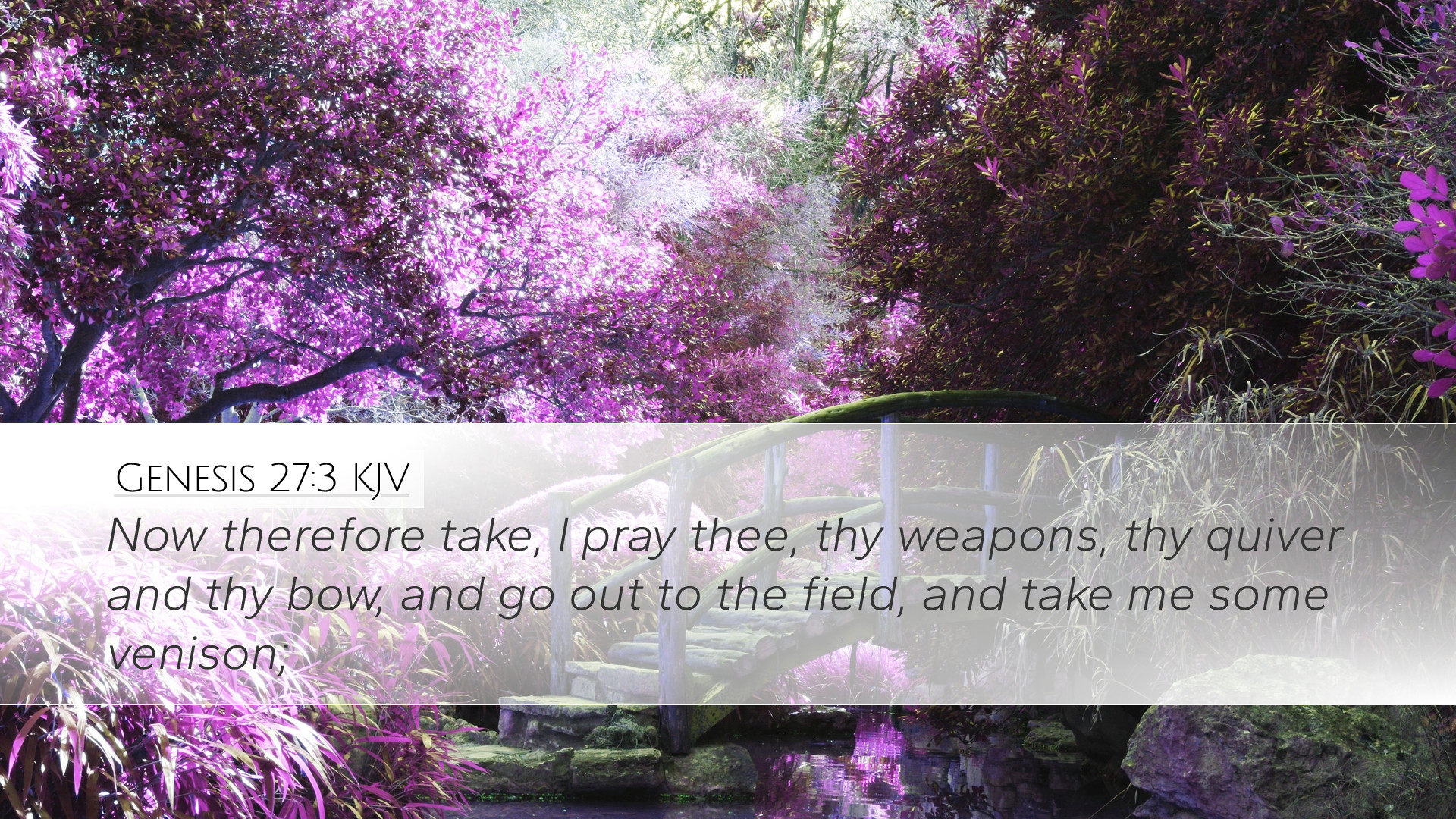Commentary on Genesis 27:3
Verse Reference: "Now therefore, take, I pray thee, thy weapons, thy quiver and thy bow, and go out to the field, and take me some venison." (Genesis 27:3)
Contextual Overview
The narrative of Genesis 27 is set within the broader context of the patriarchal history, focusing on Isaac and his sons Esau and Jacob. By this point in the story, Isaac is old and his eyesight has failed, leading to a critical moment in the transmission of blessings and identities. The verse depicts Isaac instructing Esau to prepare him a meal of venison, illustrating the familial dynamics and establishing the groundwork for the ensuing conflict over Isaac's blessing.
Theological Significance
This passage raises pivotal theological questions surrounding divine providence, familial favoritism, and the pursuit of blessing. It prompts the reader to consider the implications of human actions in relation to God's sovereign plans.
Insights from Public Domain Commentaries
Matthew Henry
“In the midst of a family, we often find conflicting desires and plans which do not align with divine will.” Henry emphasizes that Isaac's desire for venison reflects more than a mere craving for food; it symbolizes the patriarch's desire to reaffirm his connection with Esau, the son he favored. This partiality not only led to moral dilemmas but also induced rivalry and deceit within the family. Henry posits that Isaac's decision to bless Esau echoes a failure to recognize God’s earlier declaration regarding Jacob’s destiny (Genesis 25:23).
Albert Barnes
Barnes notes that Isaac commands Esau to "take thy weapons," indicating the urgency and the celebratory nature of the blessing to follow. He interprets the request for venison as Isaac's way of attempting to preserve the traditional method of blessing through the appreciation of a special meal, highlighting how food often plays a central role in familial bonding and ritual. Barnes points out that Isaac’s love for savory dishes may suggest a deeper underlying affection for Esau, contrasting with Rebekah’s favor towards Jacob.
Adam Clarke
Clarke elucidates the cultural backdrop of the blessing rite, explaining that it signified the passing of leadership and inheritance. He reflects on the implications of Isaac's instructions to Esau, urging readers to consider the weight of that blessing: it was not just a familial favor but also a spiritual endorsement of one son over another. Furthermore, Clarke warns of the repercussions of Isaac's actions, suggesting that this scenario illustrates human attempts to wrest control from God, ultimately leading to strife.
Character Analysis
- Isaac: A complex figure, Isaac's favoritism toward Esau and the subsequent command to procure venison underscore a lack of discernment regarding God’s purposes.
- Esau: His readiness to comply with Isaac's request indicates a willingness to uphold family traditions, yet also reflects a superficial understanding of spiritual matters.
- Rebekah: Though not mentioned in this verse, her later actions reveal a counter-narrative that demonstrates the consequences of favoritism and manipulation within the family unit.
- Jacob: Though absent from this instruction, Jacob’s later deceit signifies the lengths to which one might go to receive God’s promise, challenging the ethics of his covenantal claim.
Application for Pastoral Ministry
This verse serves as a poignant reminder for pastors and church leaders regarding how favoritism can disrupt family dynamics and spiritual leadership. The tension in Isaac’s family parallels contemporary issues surrounding transitions of power, resources, and blessings within congregations. Pastoral approaches should be attuned to the complexities of human relationships and the ways in which divine sovereignty interacts with our flawed choices.
Conclusion
Genesis 27:3 encapsulates a moment rife with familial tension, deception, and divine purpose. The interplay of Isaac's instructions, the familial relationships, and the unfolding events call for deep reflection on the nature of blessing, providence, and human agency. As scholars and theologians engage with this text, it is critical to view it through the lenses of both historical context and contemporary relevance, allowing the lessons of the past to inform the directions of future familial and spiritual interactions.


